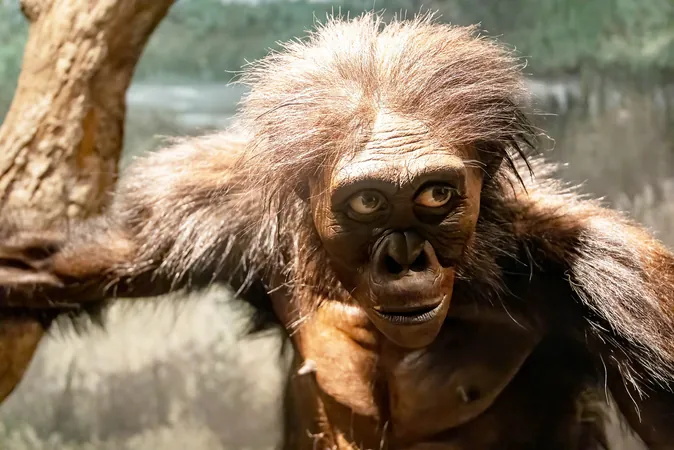
Surprising Dietary Revelations: Early Humans May Have Been Plant Eaters 3.5 Million Years Ago!
2025-01-19
Author: Jessica Wong
The long-held belief that our ancient ancestors were predominantly meat eaters has been dramatically overturned by recent research.
A groundbreaking study indicates that some of our earliest human ancestors thrived on a largely plant-based diet around 3.5 million years ago, far from the expectation of them being avid hunters.
Unearthing the Evidence: Tooth Enamel Holds Secrets
The key to this revelation lies in the analysis of nitrogen isotopes found in fossilized tooth enamel from seven Australopithecus specimens excavated from the Sterkfontein Caves near Johannesburg—a treasure trove of early hominin fossils.
By comparing the nitrogen isotopic signatures of these early human ancestors with contemporary herbivores like antelopes and monkeys, as well as carnivores such as hyenas, the research team identified Australopithecus's place in the early food web.
What they discovered was telling: the nitrogen isotope ratios in the Australopithecus teeth were low and closely mirrored those of plant-eating species. This strongly supports the idea that these ancient hominins primarily consumed plants, with animal protein in the form of insects or eggs being an occasional addition to their diet rather than a staple.
A Shift in Understanding Human Dietary Evolution
The implications of this study challenge longstanding theories regarding the role of meat in hominin evolution.
Many researchers have suggested that meat consumption was vital for the development of larger brains and advanced tool-making abilities.
While the protein and fat from meat have been linked to these evolutionary advancements, concrete evidence pinpointing when meat became prevalent in the human diet has been elusive until now.
The study implies that significant meat consumption may have emerged later in our evolutionary history, possibly correlating with the rise of the genus Homo, which followed Australopithecus.
A Technological Breakthrough in Paleoanthropology
The study's innovative nitrogen isotope analysis technique, developed at the Max Planck Institute for Chemistry, is a significant breakthrough in paleoanthropology.
This methodological advancement allows for the extraction of reliable dietary information from ancient fossils, previously thought to be limited in scope.
Professor Dominic Stratford, director of research at the Sterkfontein Caves, remarked on the significance of this new method as a game changer for understanding the diets of ancient species.
The ongoing research could answer key questions about the evolutionary advantages meat consumption may have provided, such as its impact on brain size, social behavior, and hunting strategies.
Looking Ahead: Expanding the Research Horizons
Driven by these compelling findings, Dr. Lüdecke and her team plan to broaden their research by analyzing tooth enamel from various early hominin species in different temporal and geographical contexts.
By delving into key fossil sites across Eastern and Southern Africa and Southeast Asia, they aim to unravel the timeline of meat consumption and its role in human evolutionary history.
As excitement mounts in the scientific community, one undeniable takeaway has emerged: the transition of our diets from plant-based to omnivorous diets was far more complex than previously imagined.
The evolution of our species is marked by dietary adaptability and innovation, providing a rich tapestry of interactions with food sources over millions of years.
This revolutionary study is published in the journal Science, setting the stage for future research endeavors that could unearth even deeper insights into the dietary habits that have shaped human evolution.
Stay tuned as we continue to uncover the secrets of our ancient past!



 Brasil (PT)
Brasil (PT)
 Canada (EN)
Canada (EN)
 Chile (ES)
Chile (ES)
 Česko (CS)
Česko (CS)
 대한민국 (KO)
대한민국 (KO)
 España (ES)
España (ES)
 France (FR)
France (FR)
 Hong Kong (EN)
Hong Kong (EN)
 Italia (IT)
Italia (IT)
 日本 (JA)
日本 (JA)
 Magyarország (HU)
Magyarország (HU)
 Norge (NO)
Norge (NO)
 Polska (PL)
Polska (PL)
 Schweiz (DE)
Schweiz (DE)
 Singapore (EN)
Singapore (EN)
 Sverige (SV)
Sverige (SV)
 Suomi (FI)
Suomi (FI)
 Türkiye (TR)
Türkiye (TR)
 الإمارات العربية المتحدة (AR)
الإمارات العربية المتحدة (AR)